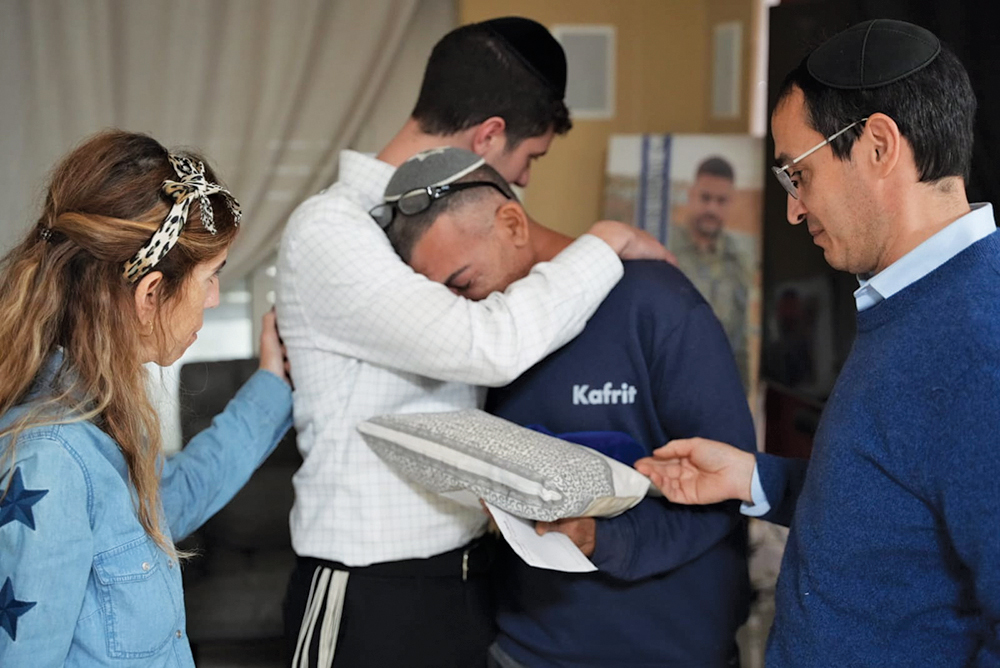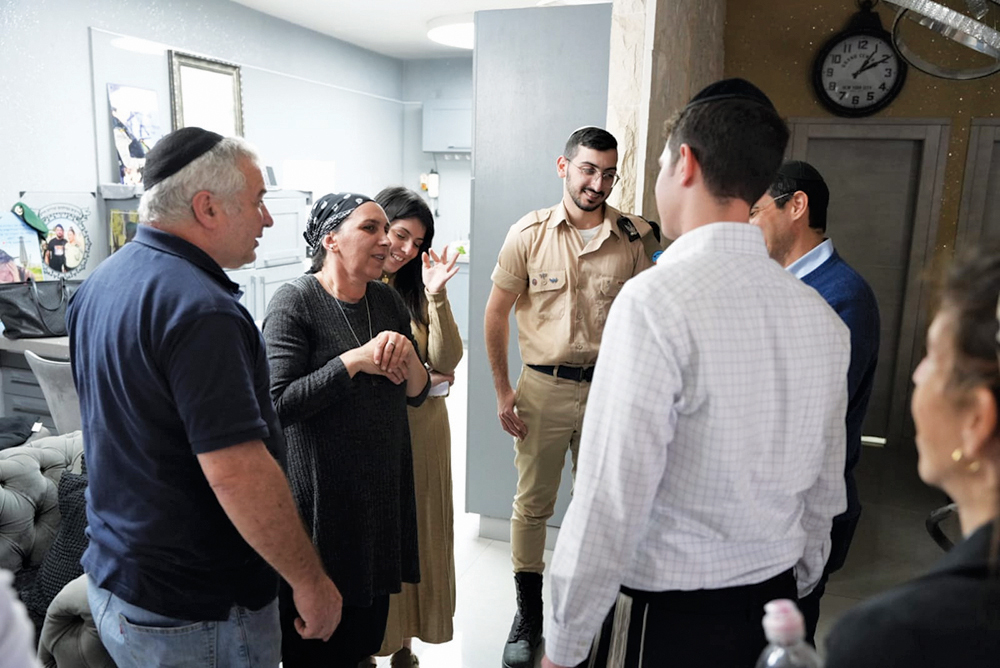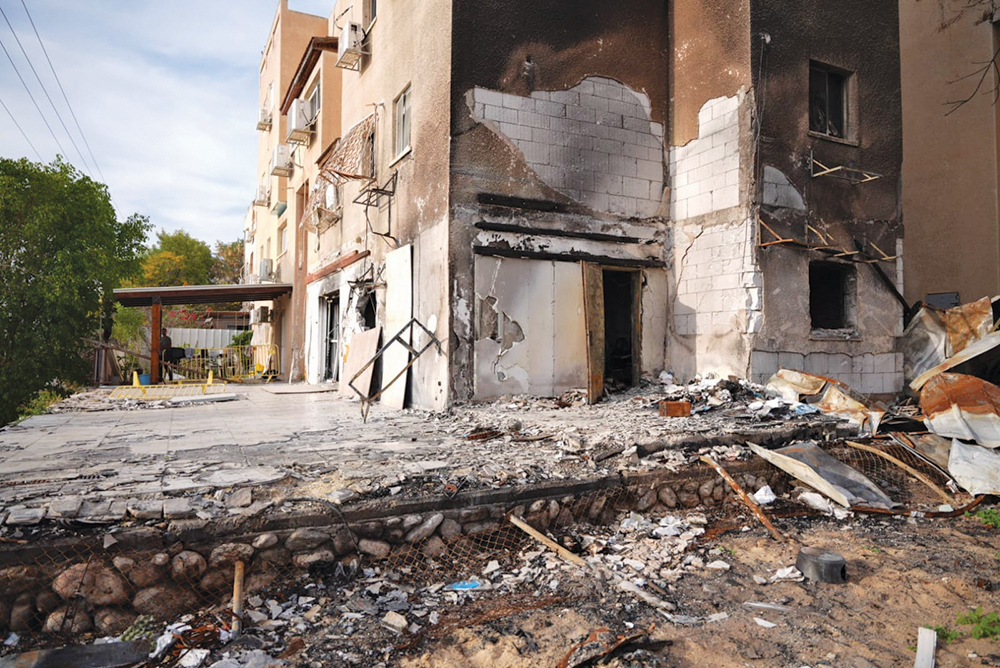
(Credit: Meir Pavlovsky, OneFamily)
(Courtesy of One Family Fund) While the Israel Defense Forces (IDF) defend the country, the people of Israel, the home front, are undergoing tremendous challenges as well. Among them are the thousands of families who have lost a child, spouse, parent, grandchild or sibling, needing assistance as they deal with unimaginable loss, trauma and hardship since Hamas unleashed what may be the most gruesome and brutal terror in modern memory.
In the early days of the war, tourists were desperately trying to return home amid canceled flights and thousands of sirens. Soon after, Israel’s tourism industry experienced the deafening silence reminiscent of the pandemic. Now, with war ongoing, those who do visit are coming with a specific purpose: Solidarity missions to witness the tragedy firsthand and to take a hands-on approach to helping Israelis through this crisis in person.

Laizer Kornwasser, from Teaneck, visited last month on a self-designed unity mission as a representative of the Congregation Beth Abraham. He sought out opportunities to meet Israelis affected by the war, hear their stories and discover ways to help at this crucial time both from within Israel and after returning to the US. He spent five days traveling the country, visiting soldiers on base and in the hospital, bearing witness, meeting families in the South, and meeting with several organizations.
Early on in his mission-of-one, Kornwasser took it upon himself to visit the OneFamily “Adopt A Family” program, which the Beth Abraham community supports. OneFamily has been matching donors and families in need who receive financial support, but more than that, an authentic and personal connection designed to last for many years. With thousands of broken and shattered families having lost loved ones in the past 12 weeks alone, the need for such matches has quickly ballooned.

While visiting Ashdod, Kornwasser met with the family of Ravit Asyag, z’’l, a 19-year-old who served in the Southern Border Police. Ravit cut short a holiday in New York to be with her unit, and on October 7, she rushed to a wooden shed in Yakhini (less than 10 miles from the border with Gaza) where terrorists were hiding. She bravely fought Hamas and saved many lives, except for her own. She was one of nine children and left behind a family heavily engulfed by the war, including two of her siblings serving in the IDF and a sister with Down Syndrome, to whom Beth Abraham gifted a much-needed computer.
From there, Kornwasser visited the Maskalzi family, who lost a grandfather, father and son. Raphael Meir and his 12-year-old son, Nathaniel, and son, rushed to help the family patriarch, Raphael Fahimi, while air-raid sirens blared on Simchat Torah, but a rocket launched by Hamas hit a gas tank on the porch. Chana, Raphael Meir’s wife, lost three generations in a single moment and now carries the burden of caring alone for the couple’s five kids, aged 2 to 11 years old, as well as her bereaved mother-in-law and Raphael Meir’s four sisters.
After meeting the Asyag and Maskalzi families, the group arrived in Ofakim to meet Yashuta Chana, a single mom of Yisrael, z’’l, a son with epilepsy, and two more children. The start of the war coincided with her son Yisrael’s 30th birthday, and despite being a civilian, he quickly set out with just 15 bullets in his pistol to battle terrorists infiltrating Ofakim. His girlfriend, Shahaf Rozolio, related that people told her at the shiva that “if he weren’t there, things would look very different in Ofakim. He really saved a whole neighborhood.” Kornwasser described Yashuta as “crushed’ as Yisrael was her “pillar of strength.”

The group had hoped for an “uneventful” Mincha after parting ways with Yashuta. “Unfortunately, that wasn’t the case,” he said, “When over 50% of the shul said Kaddish, it hit home how this community has been impacted by the last two months.”
His last meeting was with Motti Biton, a single father of four from Ofakim who lost his eldest son while he tried to save lives at the Nova festival. Nadav, z’’l, his eldest, was still in IDF service and saved three people that day, including someone who broke his leg trying to escape the terrorists. Nadav carried him on his back for over a mile. Nadav realized he couldn’t outrun the terrorists, dug a ditch, and covered the person with branches and leaves, ultimately saving his life. Nadav, who was determined to continue his heroic work, was killed shortly afterward. His father must now deal with the emotional burden of losing Nadav and the financial one brought on by the factory he works at in the Gaza Envelope being closed due to the war.
As Israelis wait for the war to end, they know that the impact will last even after the last soldier comes home. Families bereaved by the war will need significant support to cope and move forward.









